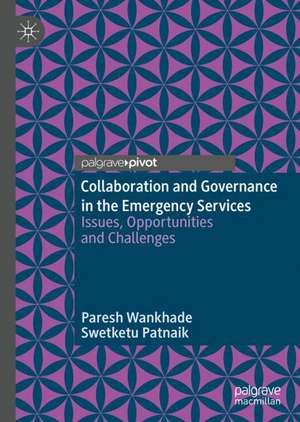Collaboration and Governance in the Emergency Services: Issues, Opportunities and Challenges
Autor Paresh Wankhade, Swetketu Patnaiken Limba Engleză Hardback – aug 2019
“Globally, emergency services are witnessing a period of unprecedented uncertainty and change caused by pressure on their budgets, reduced manpower and changing patterns of demand and service delivery. Such challenges are also having huge implications on the workforce health and wellbeing. This book is a timely, well-researched addition to improve our understanding of the governance and collaboration issues in the emergency services.”
Steve McGuirk, Chairman, Warrington and Halton Hospitals Trust, Former Chief Fire Officer and CEO, Greater Manchester Fire and Rescue Service
“Good governance, collaboration and sound leadership are easy qualities to take for granted in the Emergency Services. However, given the increasing complexity of the challenging political and operational environments these organisations work in, it is not reasonable to assume these qualities will always emerge as a natural phenomenon. This book is a welcome addition thatprovides invaluable, evidence-based insights for leaders who are seeking to raise the quality of their services for both the public and their workforce alike.”
Andy Newton, Immediate Past Chair, College of Paramedics and Former Paramedic Director, South East Coast Ambulance Service NHS Trust (SECAmb)
Preț: 418.45 lei
Nou
Puncte Express: 628
Preț estimativ în valută:
80.07€ • 83.77$ • 66.51£
80.07€ • 83.77$ • 66.51£
Carte tipărită la comandă
Livrare economică 02-16 aprilie
Preluare comenzi: 021 569.72.76
Specificații
ISBN-13: 9783030213282
ISBN-10: 3030213285
Pagini: 132
Ilustrații: XVII, 145 p. 6 illus.
Dimensiuni: 148 x 210 x 21 mm
Greutate: 0.35 kg
Ediția:1st ed. 2020
Editura: Springer International Publishing
Colecția Palgrave Pivot
Locul publicării:Cham, Switzerland
ISBN-10: 3030213285
Pagini: 132
Ilustrații: XVII, 145 p. 6 illus.
Dimensiuni: 148 x 210 x 21 mm
Greutate: 0.35 kg
Ediția:1st ed. 2020
Editura: Springer International Publishing
Colecția Palgrave Pivot
Locul publicării:Cham, Switzerland
Cuprins
Chapter 1: Introduction and background to collaboration and governance of blue light emergency services.- Chapter 2: Theoretical underpinnings of collaborations amongst emergency service organisations.- Chapter 3: Building Strategic Capacity and Collaborative Leadership in Blue Light Organisations.- Chapter 4: Trust in the context of emergency service collaborations.- Chapter 5: Mental health and wellbeing of the emergency services workforce.- Chapter 6: Professional cultures and changing identities in the emergency services.- Chapter 7: Conclusion- Collaboration and Governance: It’s very much about ‘Process’ and ‘People’.
Notă biografică
Paresh Wankhade is Professor of Leadership and Management at Edge Hill University, Lancashire, UK
Swetketu Patnaik is Senior Lecturer at Anglia Ruskin University, Cambridge, UK
Textul de pe ultima copertă
“Globally, emergency services are witnessing a period of unprecedented uncertainty and change caused by pressure on their budgets, reduced manpower and changing patterns of demand and service delivery. Such challenges are also having huge implications on the workforce health and wellbeing. This book is a timely, well-researched addition to improve our understanding of the governance and collaboration issues in the emergency services.”
Steve McGuirk, Chairman, Warrington and Halton Hospitals Trust, Former Chief Fire Officer and CEO, Greater Manchester Fire and Rescue Service
Andy Newton, Immediate Past Chair, College of Paramedics and Former Paramedic Director, South East Coast Ambulance Service NHS Trust (SECAmb)
This unique text provides fresh insights and understanding of the governance and collaboration issues between emergency services in a dynamic policy and organisational environment in a global world. The book offers critical insights into the theory and rationale behind the interoperability and collaboration between the emergency services and examines in detail, important themes around trust, leadership, workforce wellbeing and resilience and professional culture(s), each having great significance for the success of the interoperability and governance agenda. The chapters cover new materials, including the research conducted by the authors and are written in a style that is easily accessible. This book caters to a wide audience of researchers, academics, students, emergency services staff, leaders and public managers, both in the UK and internationally.
Paresh Wankhade is Professor of Leadership and Management at Edge Hill University, Lancashire, UK
Swetketu Patnaik is Senior Lecturer at Anglia Ruskin University, Cambridge, UK
Caracteristici
Examines the theory and rationale behind the interoperability and collaboration between the emergency services Develops the current knowledge and thinking behind the important themes of trust, leadership, workforce wellbeing and professional culture(s) in emergency services Highlights the role of ‘process’ and ‘people’ for the success of the interoperability and governance agenda
